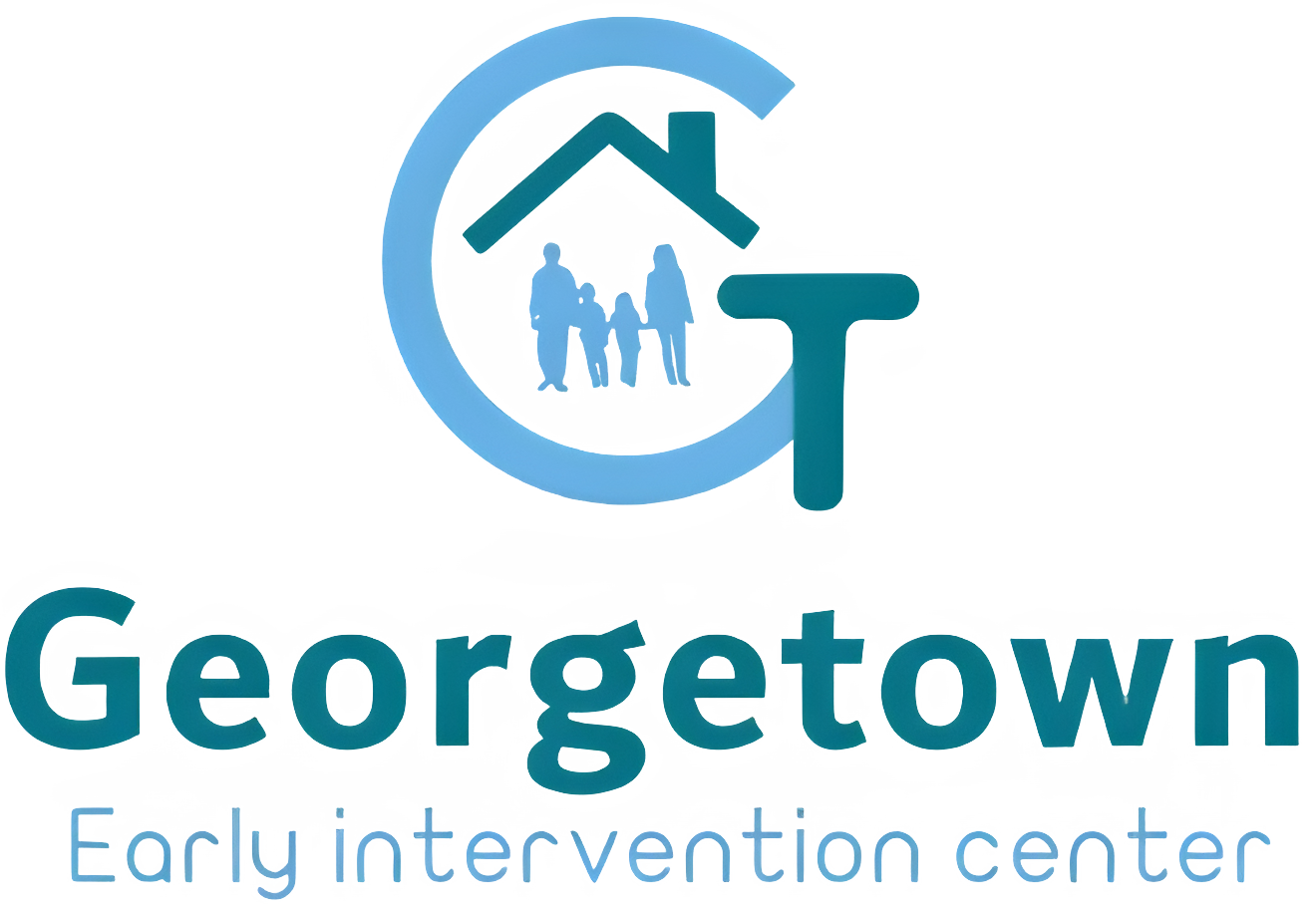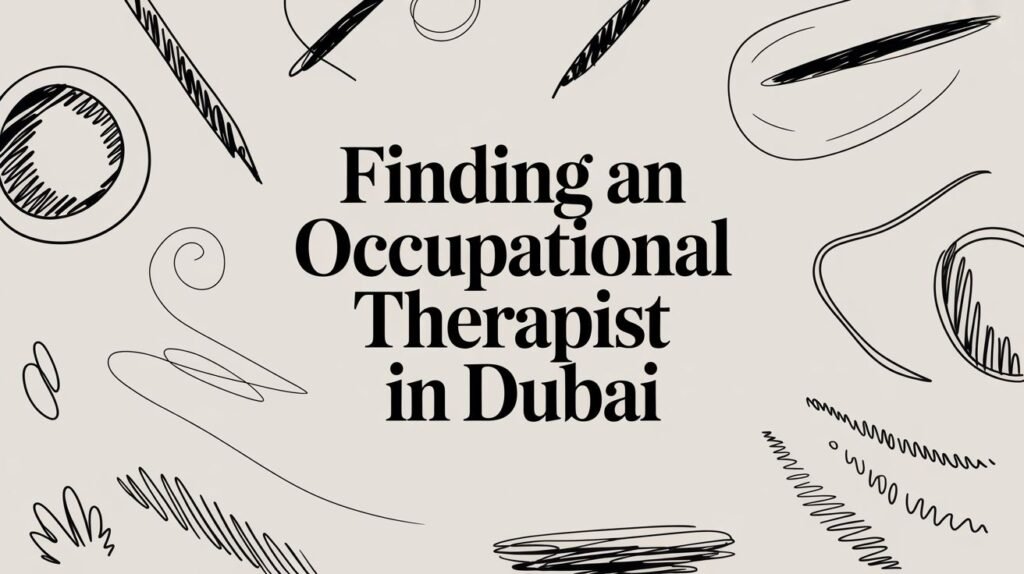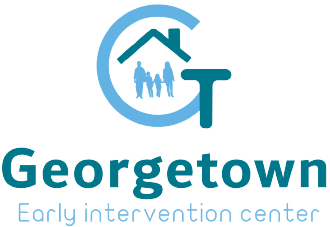An occupational therapist in Dubai is a highly trained healthcare professional dedicated to helping people of all ages do the things they want and need to do. These meaningful activities, or "occupations," are the building blocks of everyday life.
They work with anyone facing physical, sensory, or cognitive challenges to build skills, adapt their surroundings, and ultimately, live life to the fullest. Think of them as a practical, hands-on coach for mastering the art of daily living.
What Does an Occupational Therapist in Dubai Actually Do?
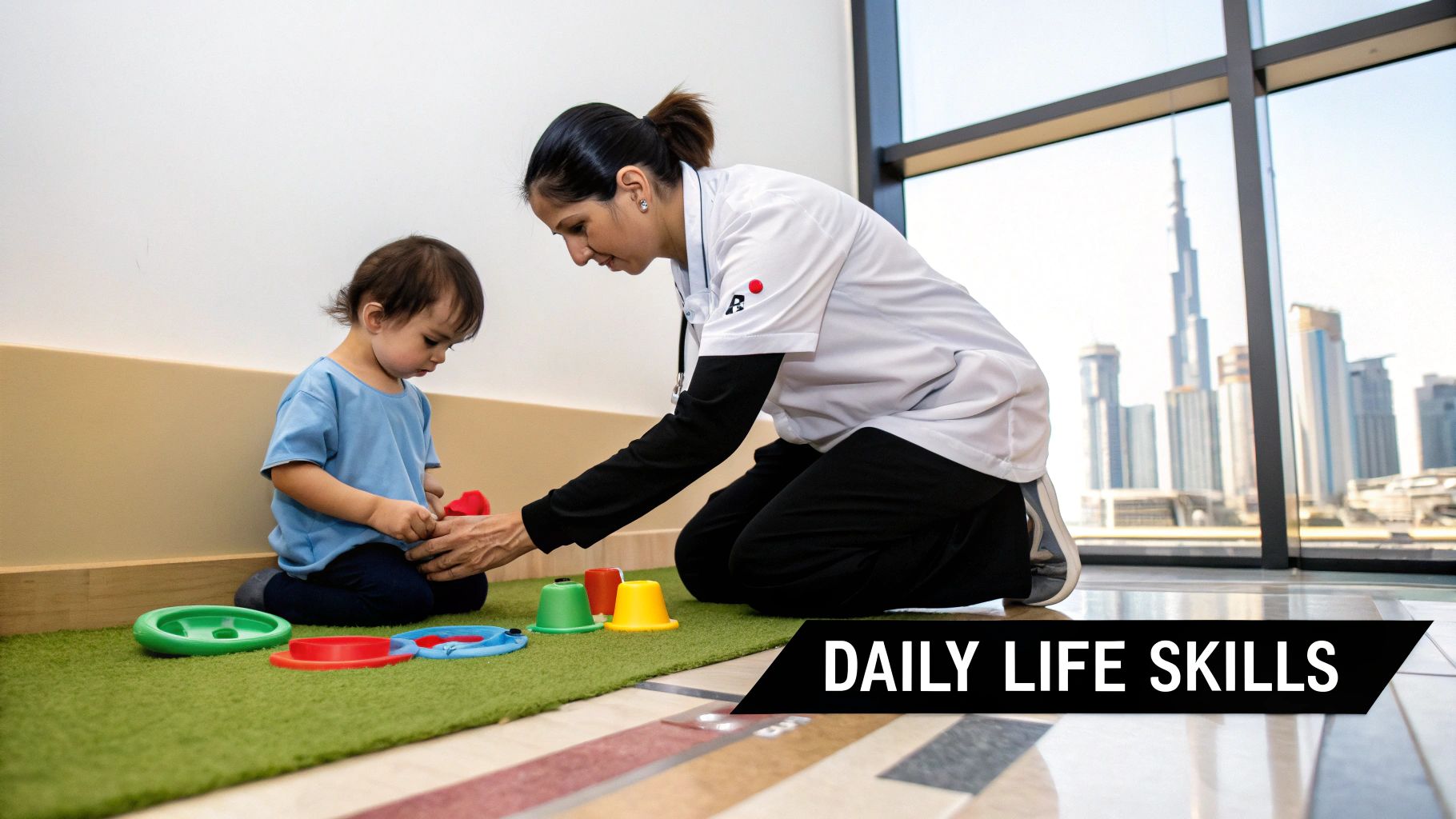
Let's unpack that "life coach" idea. Instead of focusing on career goals, an OT helps you master the essential tasks that make up your day. The term "occupation" isn't just about your job—it covers everything that occupies your time.
This could be a child learning to tie their shoelaces, a teenager developing social skills, or an adult getting back to work after an injury. An occupational therapist in Dubai is a skilled guide who helps people find ways around the barriers that keep them from living full, independent lives. Their approach is incredibly practical and completely focused on real-world results.
A Bridge to Independence
I like to think of an OT as a bridge-builder. On one side, you have a person’s current abilities. On the other, you have all the activities they want or need to do. The OT’s job is to build a solid, reliable bridge between those two points using personalized strategies and tools.
For instance, a child who gets overwhelmed by the sensory overload of a busy Dubai mall might learn coping strategies from an OT to manage the bright lights and loud noises. For a professional recovering from a hand injury, an OT creates targeted exercises to rebuild the fine motor skills needed for typing and writing.
The process usually looks something like this:
- Detailed Assessments: The OT first seeks to understand a person's unique challenges, their environment, and what they truly want to achieve.
- Personalized Plans: They then create a custom roadmap, breaking down big goals into small, achievable steps.
- Skill Development: This is the hands-on part—teaching new techniques to perform tasks more easily and effectively.
- Environmental Adaptation: Sometimes the person doesn't need to change, but their environment does. An OT might recommend simple modifications to a home, school, or workplace to make success easier.
More Than Just Exercises
What really sets occupational therapy apart is its holistic view. While other therapies might zoom in on a specific physical impairment, an OT looks at the whole person—their physical, emotional, and cognitive well-being, all within the context of their social and cultural environment.
An occupational therapist’s primary goal is to empower people. They do this by giving them the skills and confidence to take part in the activities that matter most, which in turn boosts their quality of life and helps them feel like a part of their community.
In a place as diverse and fast-paced as Dubai, this role is vital. OTs help expat families settle in, support children navigating international school systems, and assist adults in high-pressure careers. At its core, their work is all about enabling participation—helping people not just to function, but to truly thrive.
Who Can an Occupational Therapist Help?
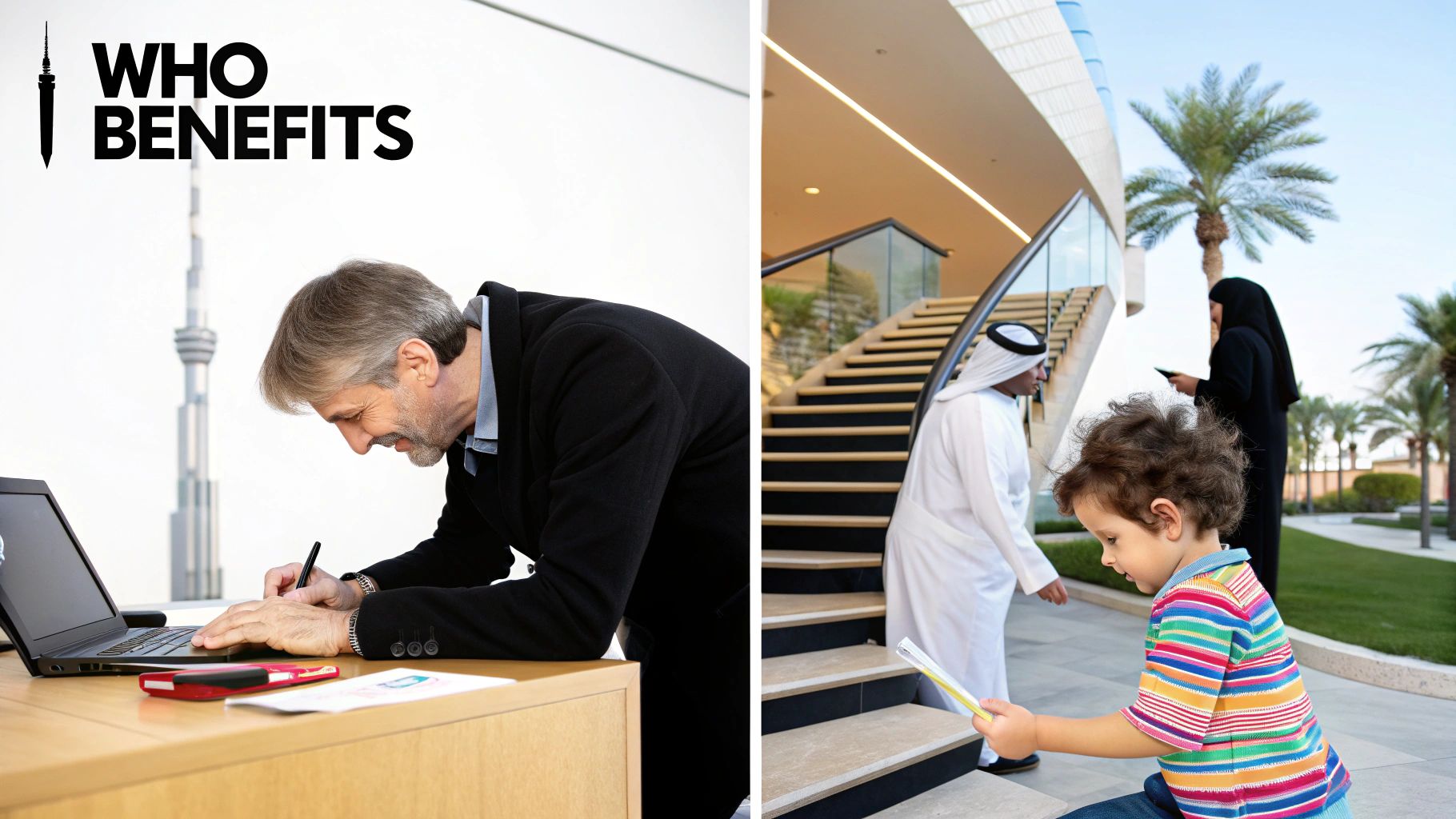
Occupational therapy casts a surprisingly wide net, supporting a diverse mix of people at every stage of life. It’s a common misconception that it’s only for a specific age group or diagnosis. The reality is much broader: it’s for anyone who finds their ability to engage in meaningful daily activities has hit a roadblock.
Think about a bustling place like a Dubai mall. For most of us, it’s an exciting trip. But for a toddler with sensory processing challenges, the bright lights, echoing sounds, and constant movement can be completely overwhelming. An occupational therapist in Dubai can step in with strategies to help that child manage all that sensory input, turning a potentially stressful outing into a fun family experience.
Children and Young Adults
A huge part of occupational therapy is dedicated to helping children and adolescents flourish. The "occupations" of childhood are things we often take for granted: learning, playing, and making friends. When a child struggles in these key areas, an OT can make a world of difference.
This often means working with children who have developmental delays, Autism Spectrum Disorder (ASD), or learning difficulties. A therapist might help a child finally master their handwriting, develop the fine motor skills to button a shirt, or build the social confidence to join in at school.
The goal is always practical and woven into the child's real life. It's about building the skills they need for independence and self-esteem. To learn more, check out our guide on who would benefit from occupational therapy for a closer look at the signs to watch for.
Adults Facing Physical Hurdles
Imagine a professional working in the DIFC who injures their hand in a minor accident. Suddenly, everyday tasks like typing an email, scribbling notes, or even gripping a coffee cup become a struggle. This doesn't just affect their work; it disrupts their entire day.
An OT would come in to design a rehab program focused on getting them back to their life, not just doing generic exercises. It’s about rebuilding the specific movements and strength they need for their unique job and personal routines.
Occupational therapy acts as a vital bridge between medical recovery and real-world independence. It translates physical healing into the practical ability to engage with one's life, work, and community once again.
This support is also crucial for individuals recovering from strokes, managing chronic conditions like arthritis, or adapting to life after major surgery. The focus is always on reclaiming the activities that make life feel normal and fulfilling.
Seniors and Geriatric Care
As we get older, new challenges can pop up that impact our ability to live safely and independently. An older adult living in their Dubai villa might start finding daily routines, like cooking or using the stairs, more difficult. They cherish their independence and want to stay in the home they love.
This is where an occupational therapist can conduct a home safety assessment and suggest simple, effective changes. These might include:
- Installing grab bars in the bathroom to prevent falls.
- Recommending adaptive kitchen tools to make cooking easier and safer.
- Teaching new techniques for dressing and personal care that conserve energy.
With these thoughtful adjustments, an OT empowers seniors to maintain their quality of life and continue living safely in their own homes for as long as possible.
Occupational therapy isn't a one-size-fits-all solution; it's a personalized approach that addresses specific, real-world challenges. The table below breaks down some of the key areas where OTs provide support across different life stages.
Common Areas Where Occupational Therapy Provides Support
| Area of Focus | Common Challenges Addressed | Examples of Therapy Activities |
|---|---|---|
| Pediatrics | Sensory processing issues, fine/gross motor delays, social skill deficits, challenges with daily routines (dressing, feeding). | Structured play, obstacle courses to build motor skills, handwriting practice, social story-telling, sensory integration activities. |
| Adult Rehabilitation | Loss of function after injury or stroke, challenges from chronic conditions (e.g., arthritis), work-related injuries. | Hand therapy exercises, training with adaptive equipment, simulated work tasks, energy conservation techniques. |
| Geriatrics | Fall prevention, difficulty with self-care (bathing, cooking), home safety concerns, memory and cognitive decline. | Home modification assessments, grab bar installation recommendations, practice with dressing aids, memory-enhancing games. |
| Mental Health | Difficulty with routine-building, lack of motivation, challenges with time management and social engagement. | Creating daily schedules, goal-setting activities, community outings, group therapy sessions focusing on life skills. |
From helping a toddler navigate a playground to enabling a senior to cook a meal safely, occupational therapy provides the essential tools for participation in life.
Finding the Right OT Specialization in Dubai
You wouldn't ask a heart surgeon to set a broken bone, right? The same logic applies to occupational therapy. It’s not a one-size-fits-all field. Finding the right occupational therapist in Dubai means matching their specific expertise to your unique situation.
Think of it like hiring a personal trainer. One might be an expert in preparing athletes for a marathon, while another excels at helping seniors build strength and balance. Each professional has a distinct skillset for a specific goal. OT specializations work the same way, ensuring you or your loved one gets the most targeted and effective support.
Pediatric Occupational Therapy
This is perhaps the most well-known area of OT, and for good reason. It centers on the "occupations" of childhood: playing, learning, and simply growing up. A pediatric OT helps kids build the fundamental skills they need to navigate their world—from the classroom to the playground.
Their work often dives into areas like:
- Developmental Delays: Supporting toddlers in hitting key milestones, whether it's crawling, walking, or forming their first words.
- Sensory Processing Issues: Helping children who get overwhelmed by loud noises or certain textures, or who might not react to things others would.
- Fine Motor Skills: Building the hand-eye coordination needed to write, button a shirt, or use a fork and knife.
- Learning Difficulties: Creating strategies for children with ADHD or dyslexia to focus and thrive in a school environment.
A session might focus on helping a child manage big emotions in a bustling classroom or develop the patience to finish a homework assignment. For a more detailed look, our comprehensive guide to pediatric occupational therapy in the UAE is a great resource.
Physical Rehabilitation and Recovery
This specialization is all about getting back on your feet after an injury, surgery, or a major health event like a stroke. The goal is intensely practical: helping people regain the ability to handle daily tasks independently and safely. We're not talking about abstract exercises; we're talking about real-world function.
An OT in this field might help someone relearn how to prepare a meal after a hand injury. Or they might help adapt a home to make it easier and safer to navigate after a hip replacement. They are masters at breaking down complex activities and finding clever new ways to get them done.
Mental Health and Wellbeing
Mental health struggles, like persistent anxiety or depression, can make it incredibly difficult to keep up with daily life. An occupational therapist who specializes in mental health helps people rebuild routines, develop coping skills, and reconnect with the activities that bring them joy and purpose.
This could mean creating a simple daily schedule to overcome a lack of motivation, practicing social interactions in a supportive setting, or learning mindfulness techniques to manage anxiety on the daily commute. The entire focus is on rebuilding the practical, everyday foundations for a fulfilling life.
Dubai has become a real hub for advancing the profession, hosting international conferences where experts from around the globe share the latest in occupational science. This dedication to professional growth means therapists here are often trained in the most current, evidence-based methods. Understanding these specializations is your first, most important step toward finding an expert who can genuinely make a difference.
What to Expect from the Therapy Process
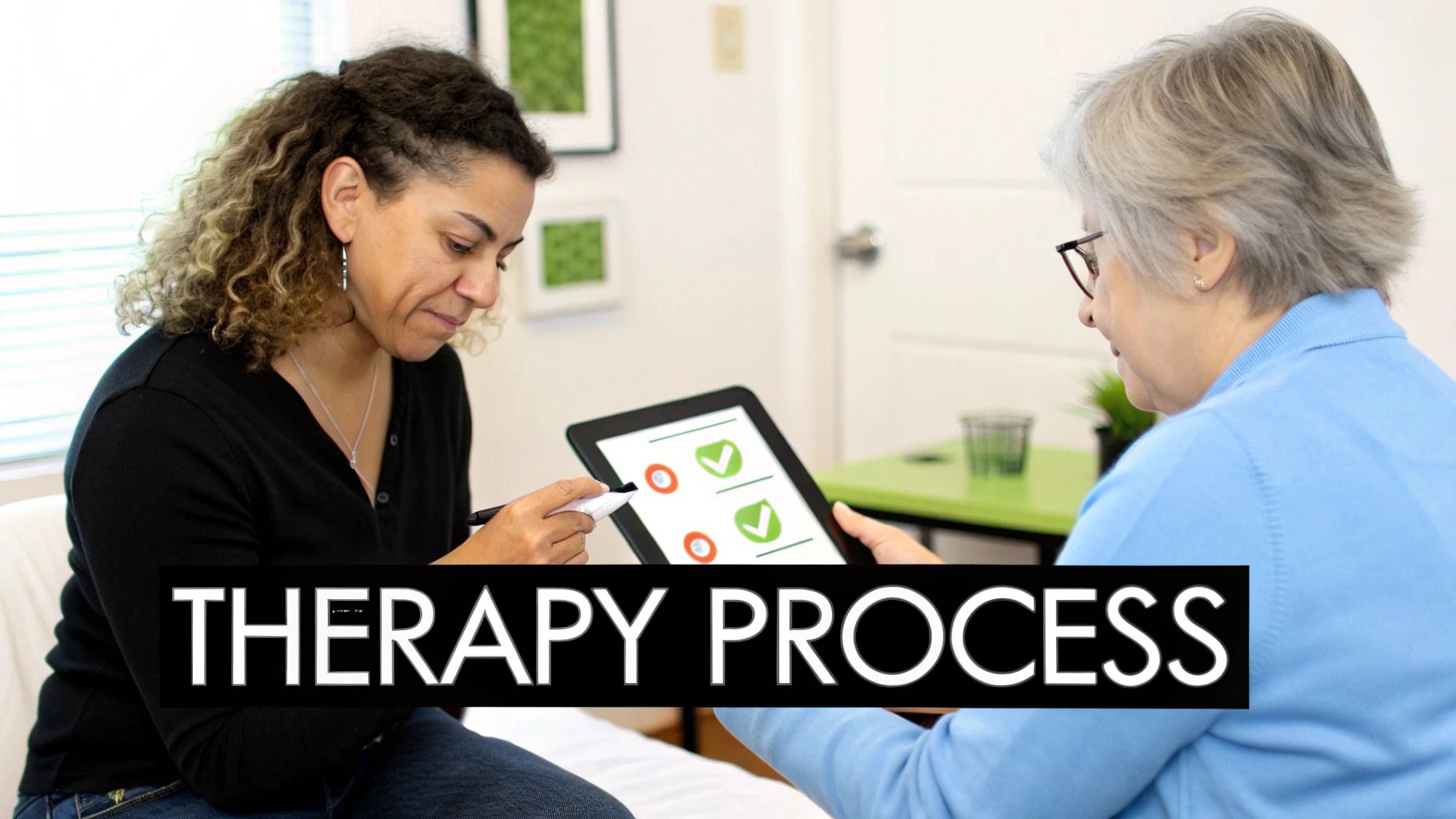
Starting therapy can feel a bit like stepping into the unknown, but the process is actually very structured and collaborative. It's built around one thing: you or your child's success. Think of your engagement with an occupational therapist in Dubai as a partnership, designed to methodically build skills and confidence. The whole journey is a clear progression toward achieving goals that truly matter.
It all kicks off with an in-depth initial consultation. This first meeting isn’t a test; it’s a conversation. It's a chance for the therapist to really understand the unique challenges and aspirations involved. They'll use a mix of discussion, observation, and sometimes standardized assessments to get a complete picture of a person's abilities and where they need support.
The goal of this first step is to establish a strong foundation of understanding. Your therapist needs to see the world through your eyes to create a plan that is not only effective but also deeply personal and motivating.
This initial deep dive ensures the therapy plan is perfectly suited to the individual, whether it's a child dealing with sensory issues or an adult recovering from an injury.
Crafting Your Personalized Plan
After the assessment, the therapist works directly with you to create a personalized treatment plan. This isn't some generic document pulled from a file. It’s a collaborative roadmap that outlines specific, measurable, and achievable goals that will guide the entire therapeutic journey.
Your plan will detail things like:
- Key Goals: What you or your child will be working toward (e.g., improving handwriting, managing daily routines).
- Therapy Frequency: How often you’ll have sessions, maybe once or twice a week.
- Therapeutic Strategies: The specific approaches and activities that will be used to build skills.
The sessions are where the plan truly comes to life. A skilled therapist makes the work feel purposeful—and often, genuinely fun. They use activities that build skills in a natural context. For a child, this might look like a game that happens to develop fine motor skills. For an adult, it could mean practicing new techniques for cooking a meal or getting back to work safely.
Tracking Progress and Adapting the Approach
Progress isn't just checked at the end; it's monitored continuously. Your therapist will regularly track improvements and chat with you about them, making sure the plan is still hitting the mark. Occupational therapy isn't static. It's meant to evolve as skills develop and new goals come into focus. Making adjustments is a normal, positive part of the process—it shows the therapy is responding to real-world changes.
The activities used in sessions are often surprisingly creative and engaging. If you're curious about the kinds of tasks that help, you can explore some great ideas for occupational therapy activities that therapists often adapt for their clients. This dynamic approach ensures every session is a meaningful step toward greater independence and confidence.
How to Choose the Right Occupational Therapist

Finding the right professional is probably the single most important step you'll take. When you're looking for an occupational therapist in Dubai, you’re not just looking for qualifications; you’re looking for a partner. Someone who connects with you or your child can completely change the outcome of therapy.
It’s easy to get overwhelmed by clinic websites and professional profiles. To make a confident choice, you need to dig a little deeper—verifying credentials, understanding their specific expertise, and, most importantly, making sure their approach feels right for you. Let's walk through how to do that.
Verify Credentials and Specialization
Before you do anything else, check for the proper license. Every single occupational therapist practicing in Dubai must be licensed by the Dubai Health Authority (DHA). This isn't just a piece of paper; it’s your assurance that they've met the UAE's strict standards for education and professional practice. No DHA license? No deal.
Next, you need to match their specialty to your needs. Occupational therapy is a massive field. A therapist who is brilliant at helping an adult recover from a stroke might not have the specialized skills to support a child with sensory processing disorder. Be direct and ask what their focus is.
Think of it this way: you wouldn't see a heart surgeon for a broken foot. Choosing a therapist with deep experience in your specific area of need—whether it's pediatrics, mental health, or physical rehab—means you're getting targeted, effective therapy right from the start.
Questions to Ask During Your Consultation
Your first meeting is more than a consultation; it’s an interview. This is your chance to get a feel for their personality and therapeutic style. Do you click? Does their philosophy make sense to you? Go in with a list of questions ready.
Here are a few essential things to ask:
- Experience: “Can you tell me about your experience with clients facing [your specific challenge]?”
- Approach: “How would you describe your therapy style? Is it structured, play-based, or a blend?”
- Family Involvement: “How do you work with parents and families? What role would we play at home to support the therapy?”
- Goal Setting: “How do we work together to decide on the goals we’ll be aiming for?”
- Measuring Success: “How will we track progress? And how often will we sit down to review the plan and see how things are going?”
Listen carefully to their answers. They’ll tell you everything you need to know about their methods and whether they’re a good fit for your family’s outlook.
Consider the Practical Details
Finally, let’s be realistic. The day-to-day logistics can make or break your commitment to therapy. Consistency is everything in OT, so choosing a clinic that actually fits into your life is a huge piece of the puzzle.
Don't forget to think about these factors:
- Location and Accessibility: How painful will the drive be from home or school during rush hour? Is there easy parking? This will become a regular part of your routine, so make it manageable.
- The Clinic Environment: What’s the vibe when you walk in? Does the space feel welcoming, safe, and properly equipped? A stimulating, kid-friendly environment is especially crucial for children.
- Insurance and Fees: Get the money talk out of the way early. Confirm they accept your insurance and get a clear breakdown of all costs. Knowing the financial side upfront prevents stress down the road.
By taking the time to weigh these different aspects—from licenses and specialties to communication and logistics—you empower yourself to find the perfect professional fit. This isn't just about hiring a therapist; it's about finding a true ally who will help you find an occupational therapist in Dubai who will become a trusted ally on your path to achieving your goals.
Understanding the Occupational Therapy Profession in Dubai
Occupational therapy isn't just a job in Dubai; it's a deeply respected and rapidly expanding part of the city's dynamic healthcare ecosystem. It’s a true career path for dedicated professionals, driven by a constant and growing need from a diverse, international population. When you choose an occupational therapist in Dubai, you're tapping into a well-established and highly valued discipline.
The career itself offers a clear and rewarding journey. You'll find OTs in all kinds of settings—from private early intervention centers and specialized clinics to sprawling government hospitals and top-tier international schools. Each environment presents its own unique challenges and opportunities for growth, showcasing the city's deep commitment to providing comprehensive care for everyone.
Career Progression and Salary Insights
For an occupational therapist, the path forward is directly linked to experience, specialization, and a commitment to continuous learning. As OTs hone their skills, especially in high-demand areas like pediatrics or neurorehabilitation, their value to the healthcare community—and their earning potential—grows significantly.
You can see this progression reflected clearly in the salary data. The average annual salary for an occupational therapist in Dubai hovers around 167,100 AED, which points to a field with real room for growth. A newcomer might start near 87,060 AED, but that number climbs quickly. An OT with over a decade of experience can expect to earn up to 210,500 AED, while seasoned experts with 20 years under their belt can command salaries as high as 251,500 AED per year. These figures often come with added benefits like housing and transport allowances, as you'll see in detailed salary reports for the UAE.
The Evolving Role of Technology in OT
Like many healthcare fields, occupational therapy in Dubai is embracing technology. Therapists are increasingly integrating digital tools into their practice, especially secure telehealth platforms that allow for remote assessments, parent coaching, and therapy sessions when meeting in person isn't an option.
The move to digital tools is about more than just convenience. It’s about making high-quality care more accessible. For families juggling packed schedules or for those living far from a clinic, technology ensures that crucial therapeutic support continues without a hitch.
This shift means therapists need to be skilled in digital best practices. Protecting patient confidentiality and ensuring clear communication are paramount, which is why resources like a comprehensive guide to video conferencing for healthcare have become so essential. It’s a perfect example of how the profession is adapting to serve the needs of Dubai's modern, fast-paced community.
Common Questions About Occupational Therapy in Dubai
It’s completely normal to have a lot of practical questions when you’re looking into therapy. To help clear things up, let’s walk through some of the most common queries people have when searching for an occupational therapist in Dubai. My goal here is to give you the confidence that comes from being well-informed.
Think of this as a quick FAQ to demystify how OT works in the region.
Is Occupational Therapy Covered by Insurance?
This is usually the very first question on everyone's mind, and for good reason. The short answer is: it depends. Coverage for occupational therapy in Dubai can vary wildly from one insurance provider to the next and even between different plans from the same company.
While many of the more comprehensive corporate policies do offer benefits for rehabilitation services, the devil is always in the details. Before you commit to anything, it's absolutely crucial to check your specific policy for:
- Service Limits: Is there a cap on the number of sessions or a maximum dirham amount covered per year?
- Co-payments: What percentage or fixed fee will you need to pay out-of-pocket for each visit?
- Referral Requirements: Do you need a formal referral from a GP or a specialist to get the costs approved?
Your best bet is to call your insurance provider directly before starting therapy. Ask for a written confirmation of your coverage so there are no surprises down the line.
Occupational Therapist vs. Physiotherapist
This is another classic point of confusion. While both OTs and physiotherapists are vital to recovery and rehabilitation, they look at challenges through different lenses. A physiotherapist is primarily focused on restoring physical movement, building strength, and improving your range of motion, often after an injury or surgery. Think of them as the body’s mechanics.
An occupational therapist, on the other hand, steps back to see the bigger picture.
The real difference is function versus occupation. A physiotherapist helps you learn to walk again. An occupational therapist helps you walk to the kitchen, make a cup of tea, and carry it safely back to your chair. It's all about reconnecting you with the meaningful activities that make up your daily life.
An OT helps you engage in your "occupations"—and that doesn't just mean your job. For a child, an occupation is learning to tie their shoes. For an adult, it could be anything from cooking a meal to getting back to their career. OTs look at the physical, cognitive, and environmental pieces of the puzzle to help you regain independence.
How Long Does Therapy Usually Last?
There’s no one-size-fits-all answer here because every person's situation is completely unique. The duration of therapy hinges entirely on your personal goals, the complexity of the challenges you're facing, and how you progress over time.
For one person, a few highly focused sessions might be all it takes to master a new skill or adapt to a challenge. For someone else, like a child with a developmental delay or an adult recovering from a major stroke, therapy might be a supportive part of their life for several months or even longer.
Your therapist won't leave you guessing. They’ll create a personalized plan with an estimated timeline during your initial assessment and will constantly review and discuss it with you as you move forward.
